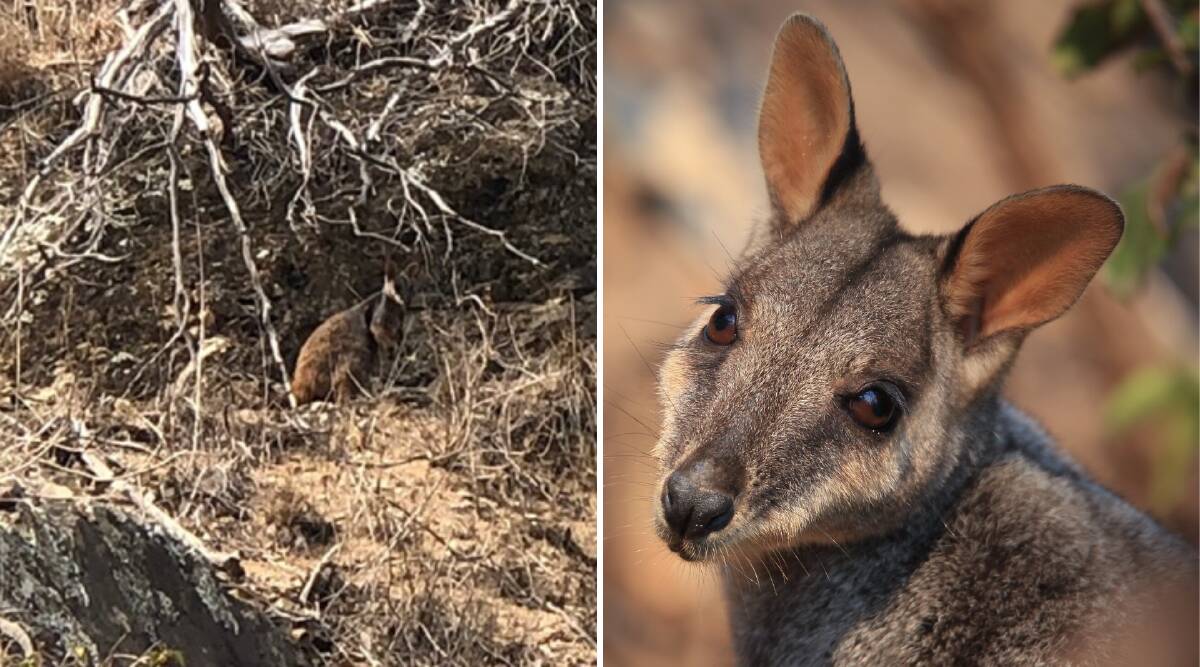
A lot of focus has been put on the plight of koala populations following bushfires on the Mid North Coast of NSW, but there is another species that is in a dire situation throughout the State due to the bushfires and drought, and is consequently at threat of serious population decline.
Subscribe now for unlimited access.
or signup to continue reading
The brush-tailed rock wallaby is an endangered species that is now only found in isolated pockets between southern Queensland and northern Victoria. In some areas it is critically endangered.
What is currently occurring to the rock wallabies and their habitat now leaves them in danger of extinction.
"There are populations that are gone, that have been incinerated by fire. There are populations that are at imminent risk. There is one (population) in Kangaroo Valley, that is safe, and there are only 30 wallabies that are in that population. So it's bad," said Aussie Ark director and conservationist Tim Faulkner.
There are populations that are gone, that have been incinerated by fire.
- Tim Faulkner, director Aussie Ark
Populations that have not been affected by fire are severely impacted by drought.
On the Mid North Coast of NSW, Tim Faulkner found a population by the banks of the Barnard River in Curracabundi National Park in the Manning River catchment while searching for Manning River helmeted turtles, another endangered species that is believed to be impacted by fire and drought.
"Last week we were up there looking at turtles and nine brush-tailed rock wallabies were found down near the water. Frighteningly, they didn't hop away. They didn't do what wallabies do. Their hips were obvious. They're not in great shape. And that's in an area that hasn't been impacted on fire. That's the drought," Tim said.
"The Barnard area hasn't burnt yet, but it is surrounded by fire.
"The Barnard River area is a real stronghold for rock wallabies. There are significant efforts from National Parks and Wildlife Service (NPWS) and the Rural Fire Service (RFS) to preserve that area and stop the fire from getting there. It's one of very few areas that the wallabies haven't been totally fire affected in yet," he said.
Brush-tailed rock wallabies are one of the eight species that Aussie Ark is working with on species recovery at their Barrington Tops facility and sanctuary.
Staff from the Ark are monitoring the Barnard site and installing cameras. Tim says water is not a problem as yet, as although the Barnard River has stopped flowing, there is still water in isolated pools. Food, however, is a different situation as the Manning catchment is in the grip of the worst drought in the area's recorded history.
"If we see signs of credible ill-health, or fire threatens to come through, we'll commence food drops of sweet potato and carrot," Tim said.
However, that is only on that site. Populations of the species in other sites in are in similar situations, or worse, due to no food or water because of fire. There is a desperate need for food and water on those sites and the response to their situation needs to be expanded beyond the Barnard River site.
"The response to rock wallabies needs to go much further than the Barnard River region, in our region, in our community, and the species banner that we work with. There are other areas that are far more significantly affected and there are wallabies starving to death," Tim said, after being asked what is being done for the species in other areas.
The NSW Office of Environment and Heritage has been contacted and to the best of our knowledge there is no immediate response being undertaken.
- Tim Faulkner
"The NSW Office of Environment and Heritage has been contacted and to the best of our knowledge there is no immediate response being undertaken.
"I personally, and Aussie Ark, recognise that the fires are still burning and human life and assets are severely threatened, and we commend, and mass kudos to, the RFS and NPWS staff that are fighting these fires. They are tired, they are exhausted, and they are all out there fighting these fires," Tim said, recognising that NPWS staff in the field are pushed to the limits.
"The issue is much bigger than rock wallabies. Again, just in our region, Manning River turtles, koalas, platypus - the loss of biodiversity is just profound. But with the rock wallaby we can do something - offer water stations and drop food. That's the difference of honing in on this one at this point of time - we can do something.
Related reading: The river runs dry - Manning River at zero flow
"The ideal thing would be to provide food drops to wallabies further afield than the Barnard area.
The Manning River Times contacted the NSW Office of Environment and Heritage, which is responsible for NPWS and runs the Save Our Species program, under which the the brush-tailed rock wallaby falls.
No comment had been received at the time of publishing, however the following was published on the NSW National Parks and Wildlife Service Facebook page earlier that day in a post on spotted-tailed quolls:
"More action is needed to help protect wildlife as their habitats recover. NPWS will be delivering post-fire initiatives to promote the recovery and protect species that have been impacted by these unprecedented fires, such as additional feral animal control measures."


